The first face-to-face meeting of the Board of the National Union of Journalists of Ukraine (NUJU) since the beginning of the large-scale Russian invasion was held at the central office of the NUJU in Kyiv on July 6. At the meeting, the NUJU board members and the NUJU Audit Commission secretaries and members discussed the challenges the journalistic community of Ukraine is facing today. The meeting participants also made decisions and adopted the required statements.
“Journalists are important! Journalism is not a crime!”
The meeting participants honored the memory of colleagues killed as a result of Russian aggression with a minute of silence. According to the NUJU, the war has already taken the lives of at least 67 journalists.
The President of the NUJU, Sergiy Tomilenko, handed the diploma of the Ihor Lubchenko National Award for Protection of Freedom of Speech, awarded to Crimean journalist Vladyslav Yesypenko, over to his wife, Kateryna Yesypenko. Vladyslav himself could not come being kept in prison on trumped-up charges by the occupation authorities.
Sergiy Tomilenko emphasized the Union‘s solidarity with the illegally imprisoned Crimean Tatar journalists Vladyslav Yesypenko, Iryna Danylovych, Nariman Dzhelyal, and other Ukrainian media persons being held hostage by the occupiers. Sergiy Tomilenko recalled that Vladyslav Yesypenko and Iryna Danylovych were recently admitted to the ranks of the Union and, therefore, to the International Federation of Journalists.
Kateryna Yesypenko expressed gratitude for the award and noted that she lives with great hope that, in the near future, Vladyslav himself will be able to be a guest at the NUJU events. Also, on behalf of Vladyslav Yesypenko and Iryna Danylovych, she thanked the Union for accepting them into its ranks.
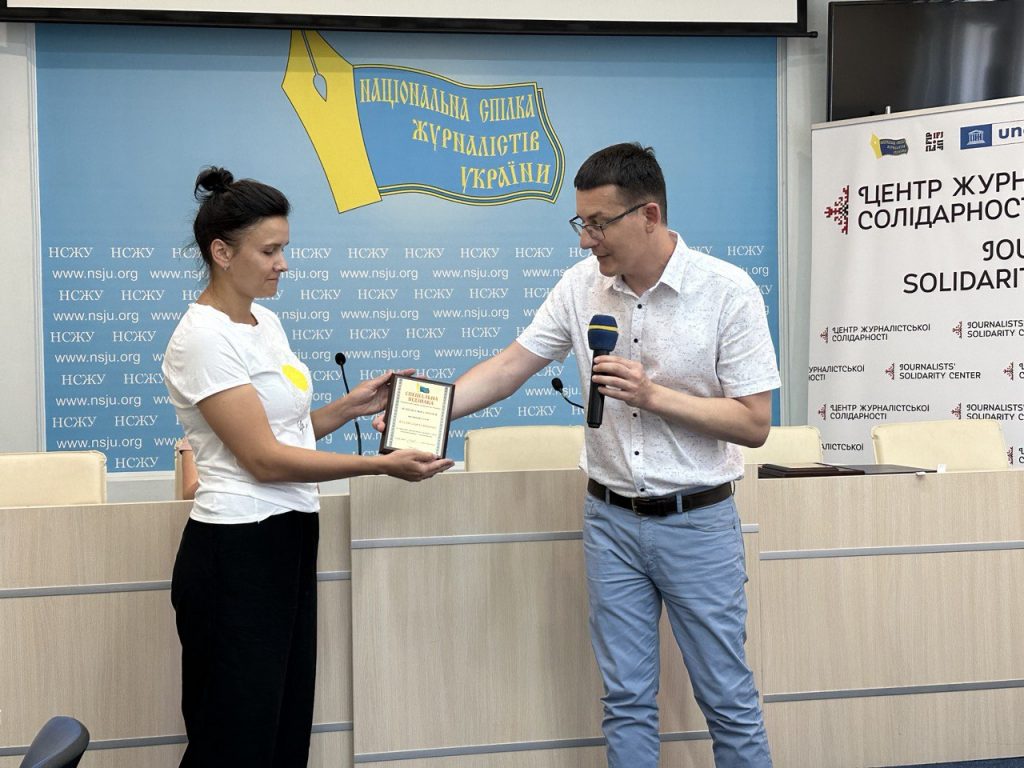
At the suggestion of the Crimean journalist/NUJU Secretary, Mykola Semena, the NUJU Board and Secretariat adopted a joint statement in support of illegally convicted Ukrainian journalists. In particular, the statement says that the special services of the aggressor, especially after the full-scale attack on Ukraine, are intensifying the persecution of independent journalists. According to human rights activists, during the entire period of occupation, the number of Ukrainian political prisoners in Russian torture camps reached 287 people. One hundred ninety-five of them are Crimean Tatars. One hundred eighty-two prisoners of conscience – citizens of Ukraine are still being held behind bars. That number includes 116 Crimean Tatars. The Union calls on human rights organizations to take legal cases against Ukrainian journalists under constant surveillance, the media to spread information about the journalist prisoners as much as possible, and the authorities to make efforts to release the Kremlin prisoners through exchanges and negotiations.
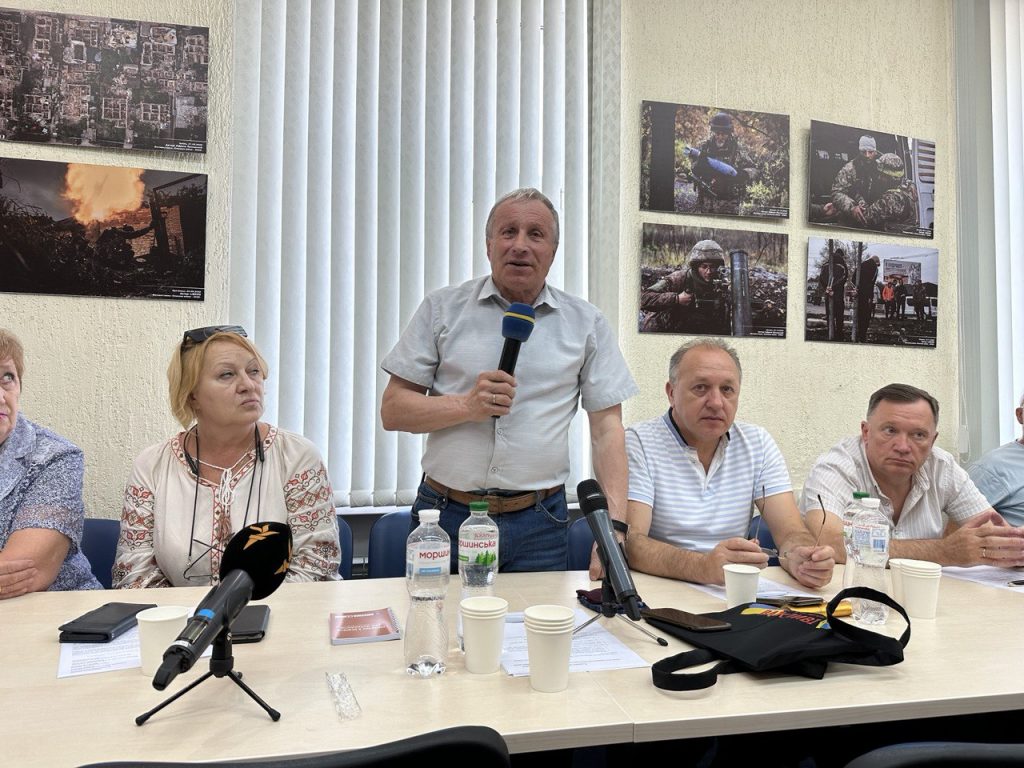
At the extended meeting of the NUJU Board, an appeal was also approved to unite the efforts of media workers, public and professional institutions, all citizens of Ukraine, and the world community for the release from Russian captivity of veteran journalist Iryna Levchenko and her husband Oleksandr, who were taken hostage in Melitopol on May 6, 2023. Their fate is currently unknown. The journalistic community finds the illegal arrest of Iryna and Oleksandr Levchenko as “another criminal challenge by the occupation authorities of Melitopol to all human and international norms and laws, a cynical disregard for human rights and the professional rights of journalists.” The NUJU firmly demands that the occupation authorities stop the lawlessness and return the freedom of Iryna and Oleksandr Levchenko.
The President of the NUJU, Sergiy Tomilenko, recalled that the primary priority of the NUJU is the safety of journalists, regardless of whether they are members of the Union. This activity is actively supported by international partners who provide financial assistance, protective equipment (body armor, helmets, first-aid kits), etc. The most powerful means of supporting Ukrainian media workers is the network of Journalists’ Solidarity Centers, which operates with the support of the International and European Federations of Journalists, UNESCO.
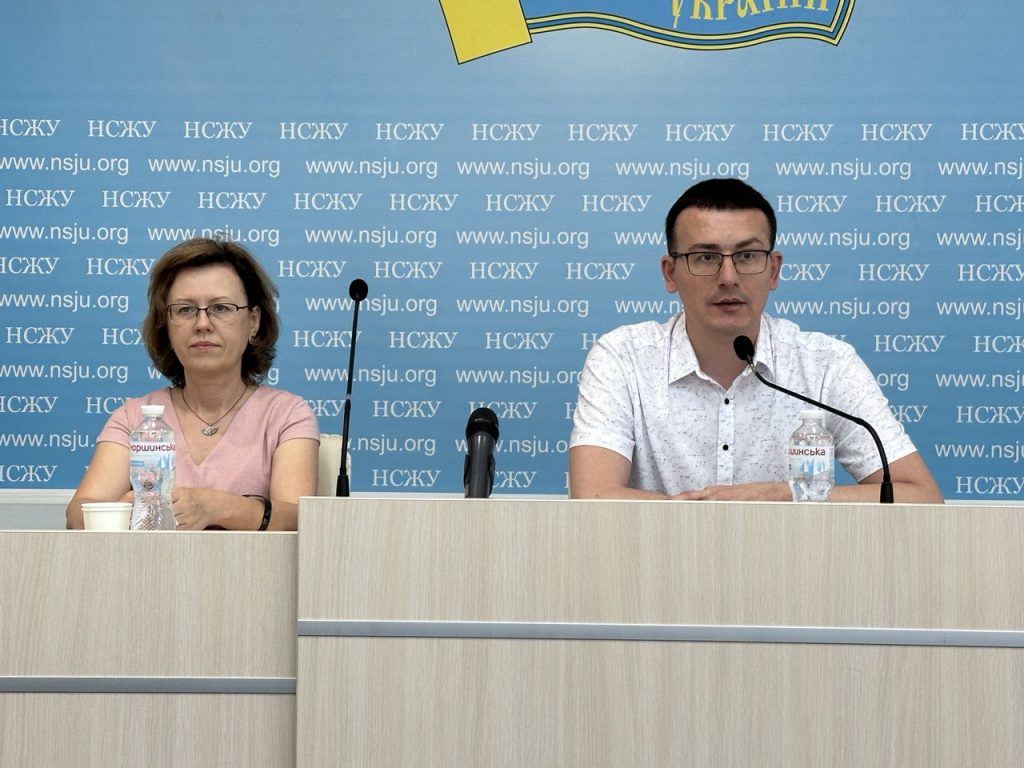
NUJU focuses on Journalists’ Solidarity Centers and assistance to displaced journalists
Centers‘ coordinator/NUJU First Secretary Lina Kushch spoke about the activities of the Journalists’ Solidarity Centers network. In particular, she emphasized that new activity directions have been added to the usual ones (providing the urgent needs of journalists in trouble and supporting colleagues working in dangerous conditions).
In particular, with the participation of UNESCO and the Government of Japan, mentoring support is provided to 27 newspaper newsrooms from the de-occupied and front-line territories, whose representatives, over the course of several months, gain knowledge on attracting funds to newsrooms, improving content and observing journalistic standards during wartime, digitization and the use of digital media platforms. In particular, a two-day training for front-line publication editors took place within this project’s framework.
In addition, the Journalists’ Solidarity Centers began actively cooperating with the Armed Forces of Ukraine (AFU) to improve the working conditions of Ukrainian and foreign journalists covering events in the war zone.
“This is a large and often non-public work in which we are involved,” Lina Kushch noted. “We help when problematic issues arise for foreign and Ukrainian journalists; we work out our recommendations for improving accreditation rules, communication between press officers and civilian journalists, etc.”
Lina Kushch emphasized the importance of the participation of the NUJU President (for the first time!) in an event at the UN General Assembly, where he made a statement about the needs of Ukrainian journalists and Russian war crimes. In her opinion, the fact that the needs of the Ukrainian media, primarily from the front-line areas, were discussed at such a level is a real breakthrough, which significantly helped attract and retain the attention of the world’s financial donors to the problems of Ukraine.
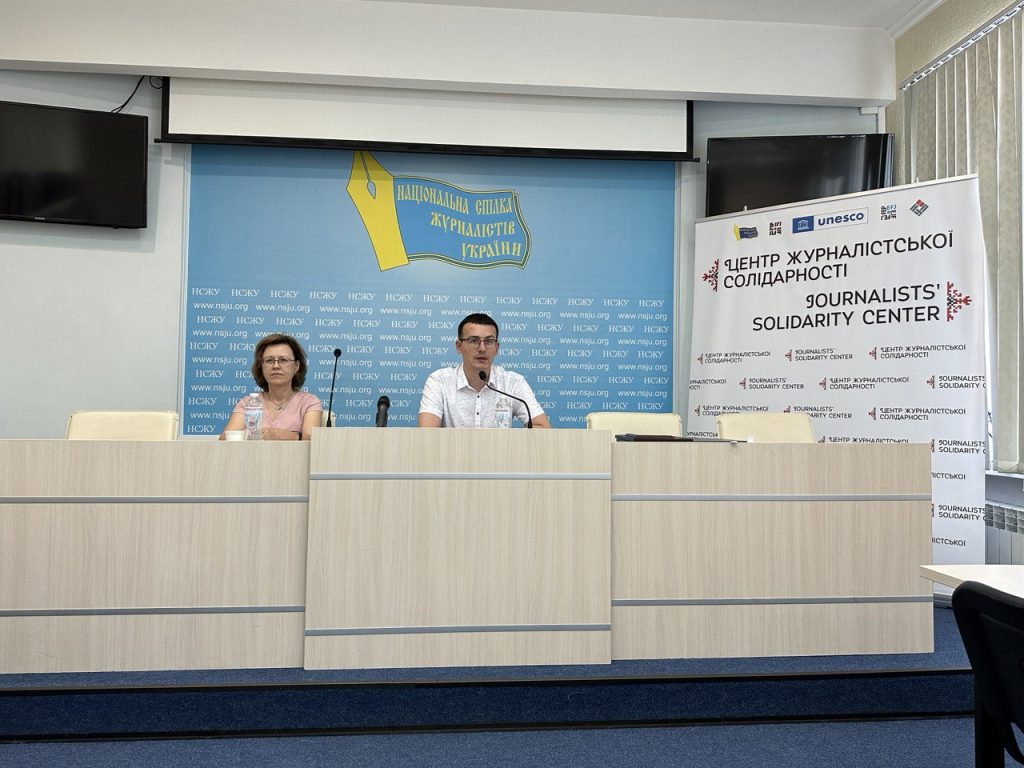
Recently, a meeting was held in the central office of the NUJU with the UNESCO Kyiv Liaison Officer, Chiara Dezzi Bardeschi, and the Ambassador Extraordinary and Plenipotentiary of Japan to Ukraine, Matsuda Kuninori, who supported the new directions of activity of the network of Journalists’ Solidarity Centers of Ukraine. In addition, a number of online meetings were held with the NUJU‘s international partners.
Head of the Zaporizhzhia regional organization of the NUJU/Honored Journalist of Ukraine, Nataliya Kuzmenko, spoke about the work of the Journalists’ Solidarity Center in Zaporizhzhia. She noted that the editors of regional newspapers were among the journalists helped by the Center. They were in a complex psychological state; some could not even speak. Therefore, the Center put a lot of effort into making them feel at home in Zaporizhzhia. It was necessary to solve problems from their household, financial, and, of course, creative needs. In addition to direct assistance and various training sessions, exciting developments of the Zaporizhzhia Center include art therapy (involvement of displaced journalists in various art events) and cooperation with volunteer organizations. Volunteers help journalists in trouble, and journalists help volunteers.
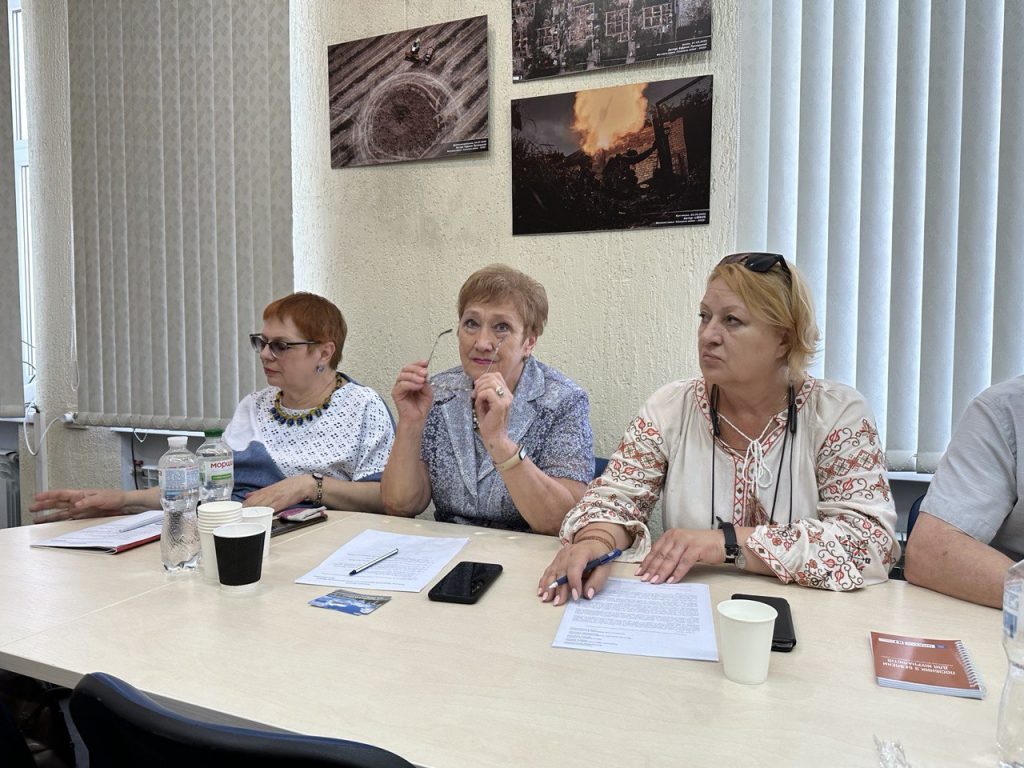
The head of the Dnipropetrovsk regional organization, Oleksii Kovalchuk, noted that the Dnipro Journalists’ Solidarity Center at the beginning of the full-scale war did a great job of helping displaced journalists from the Donetsk, Luhansk, and Kharkiv Regions. The Dnipro was the first stop where they could attend and take a breath to decide how to proceed. Currently, work to support displaced colleagues continues. Oleksii Kovalchuk emphasized that war is a time to unite in support of all media workers, regardless of whether they are members of the NUJU.
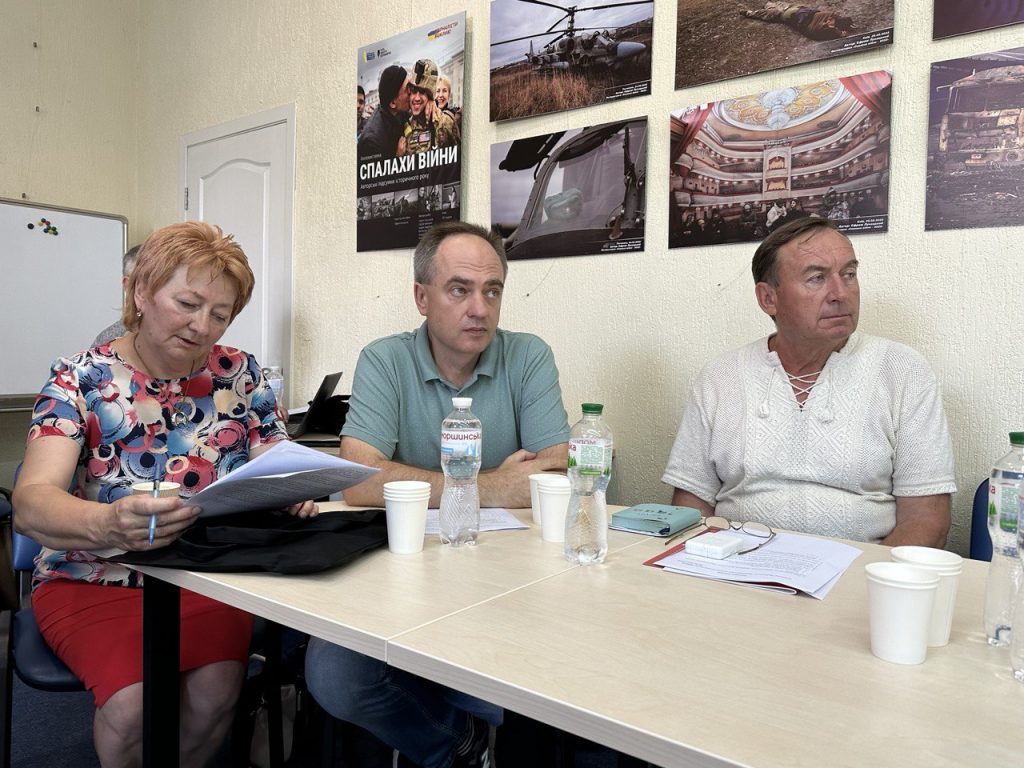
The head of the Kherson regional organization of the NUJU, Valerii Dolyna, spoke about the sad experience of rescuing journalists from the Kherson Region from the occupation. Currently, despite systematic shelling, only one newspaper is published in the region – Visti (Novovorontsovka District), which is headed by journalist Iryna Kosharska. The newspaper is supported by the NUJU. At the same time, journalists who had to go to other regions of Ukraine and abroad are trying to find the strength to stay in the journalistic profession. Valerii Dolyna thanked the central office of the NUJU for the constant support of Kherson journalists.
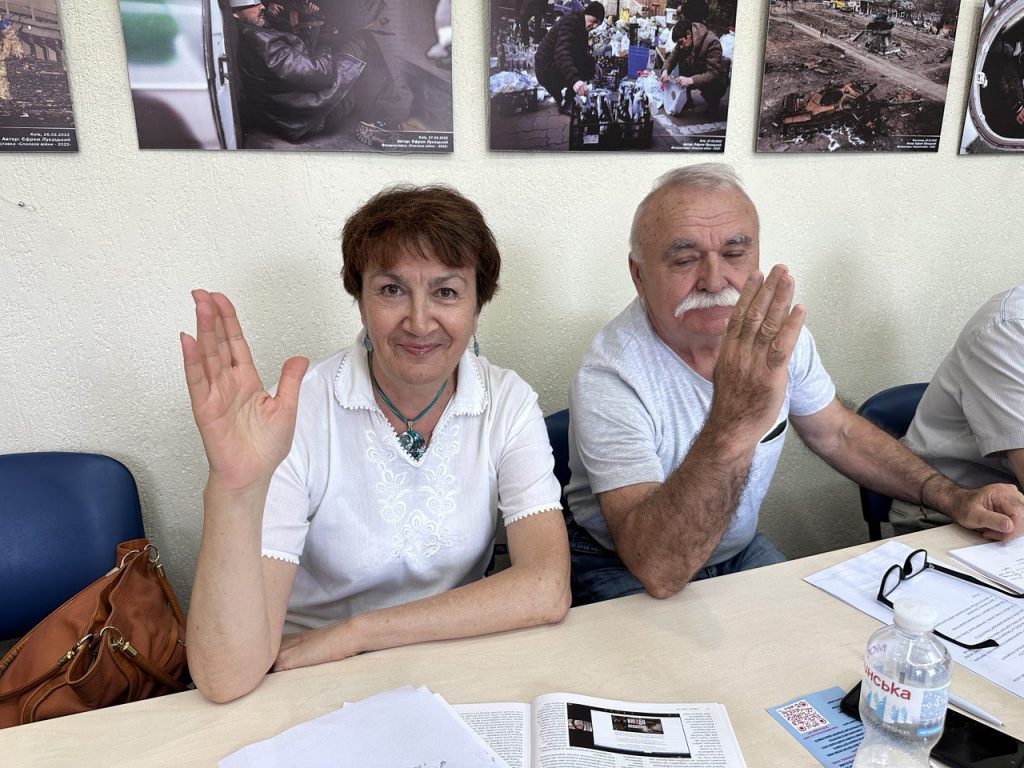
As noted by Volodymyr Bober, the head of the Chernivtsi regional organization of the NUJU, Bukovyna became one of those regions that received the most displaced journalists. Hence, a lot of effort had to be made to support them and help them stay in the profession. He noted the importance of the help of international financial donors. Volodymyr Bober quoted the words of the head of one of the newspapers in the south of Ukraine, which was able to resume printing with the support of the NUJU. “Thanks to the Union, I feel human again!” said the editor. He emphasized that it is not only the NUJU‘s responsibility to support the media, as it should become a part of the state policy.
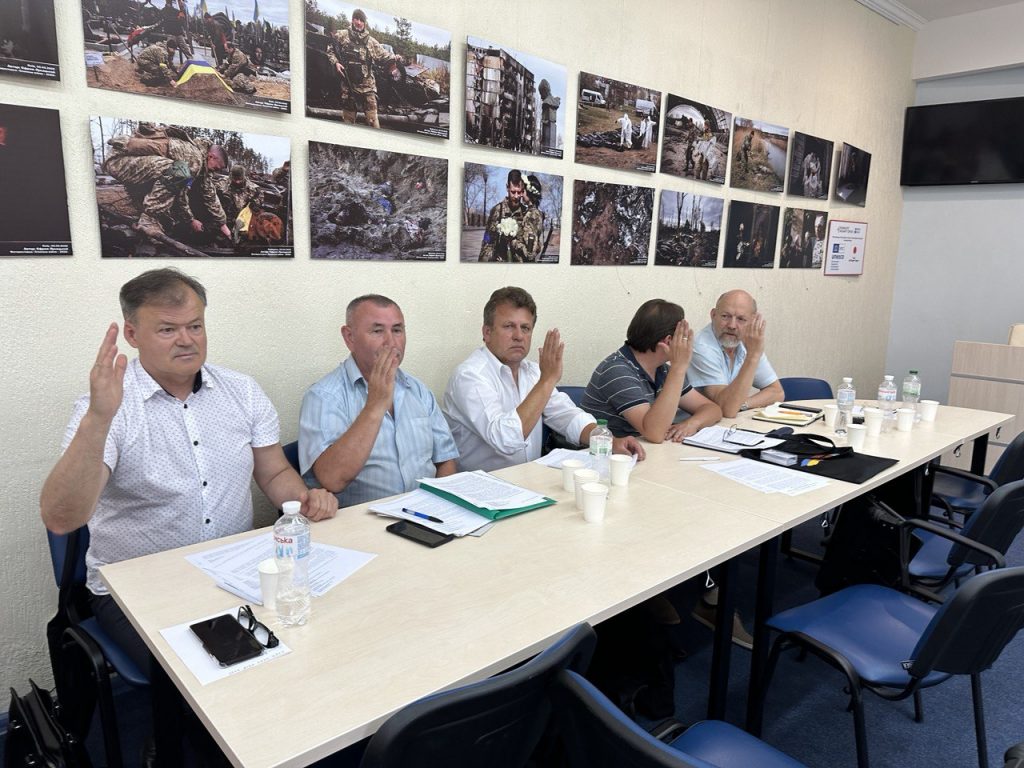
The head of the Kyiv regional organization of the NUJU, Mykhailo Soroka, noted that 125 new members were added to this organization over the past year – this certainly testifies to the Union‘s authority. He spoke about the fact that the Kyiv Union had recently published two volumes about journalists in the war, which gained quite a resonance. The head of the regional organization noted that newsrooms of publications in the Kyiv Region suffered significant damage as a result of the occupation of part of the region. Unfortunately, they did not receive genuine support from the regional authorities. Mykhailo Soroka supported the proposal of Pavlo Smovzh, the editor of the Ivankiv newspaper Tribune Pratsi, to ask the Verkhovna Rada of Ukraine to amend the law on the denationalization of print media or at least to intensify press coverage of the activities of power structures in order to provide print media with material support at least for the period of the war.
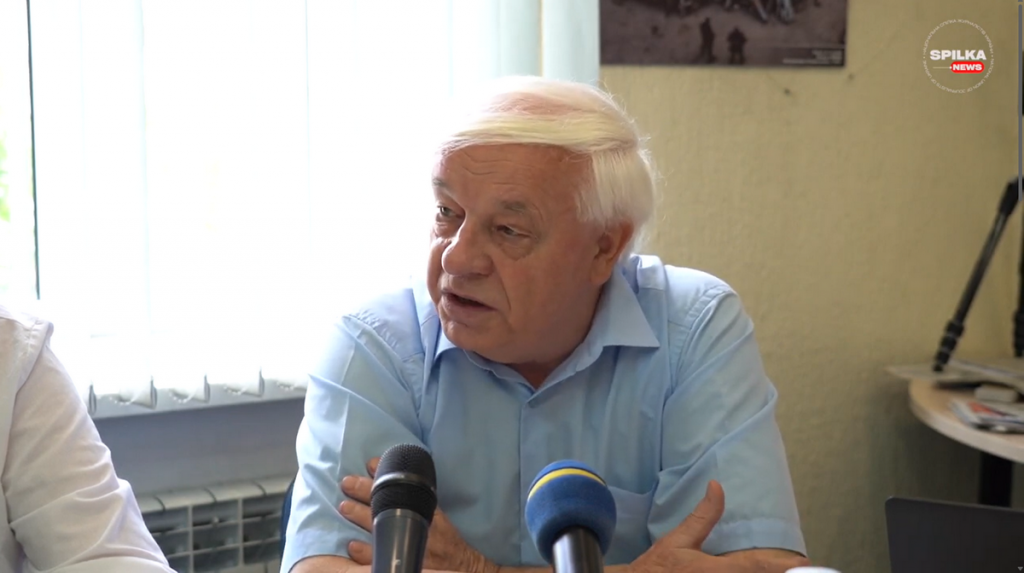
According to the head of the Sumy organization of the NUJU, Volodymyr Sadivnychyi, only one newspaper – the Okhtyrka newspaper Prapor Peremohy – could not withstand the challenges of the war in the region. He added that he informed the then-head of the Regional Military Administration about the critical condition of the publication. Volodymyr Sadivnychyi also spoke about the cooperation of the regional organization of the NUJU with the regional employment center, which conducts operational and quality consultations on labor relations in editorial teams, and with the representative of the National Television and Radio Broadcasting Council of Ukraine in the Sumy Region.
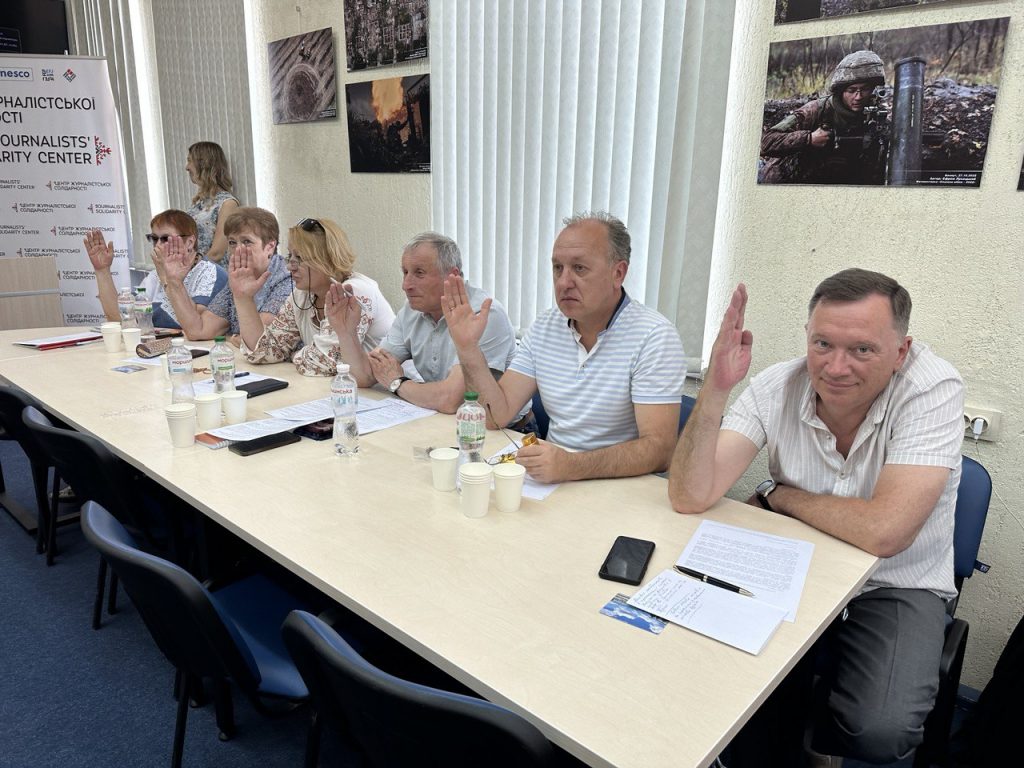
Yurii Rabotin, the head of the Odesa regional organization of the NUJU, spoke about his organization’s work with displaced journalists from the Donetsk, Kyiv, Kherson, and Mykolayiv Regions. Thematic meetings are held in libraries and military units, and humanitarian aid is organized for newsrooms. Unfortunately, about ten newspapers in the region have stopped printing, and the circulation of others has decreased significantly. At the same time, appeals of the regional organization to the authorities of the Odesa Region, unfortunately, have not yielded any results yet.
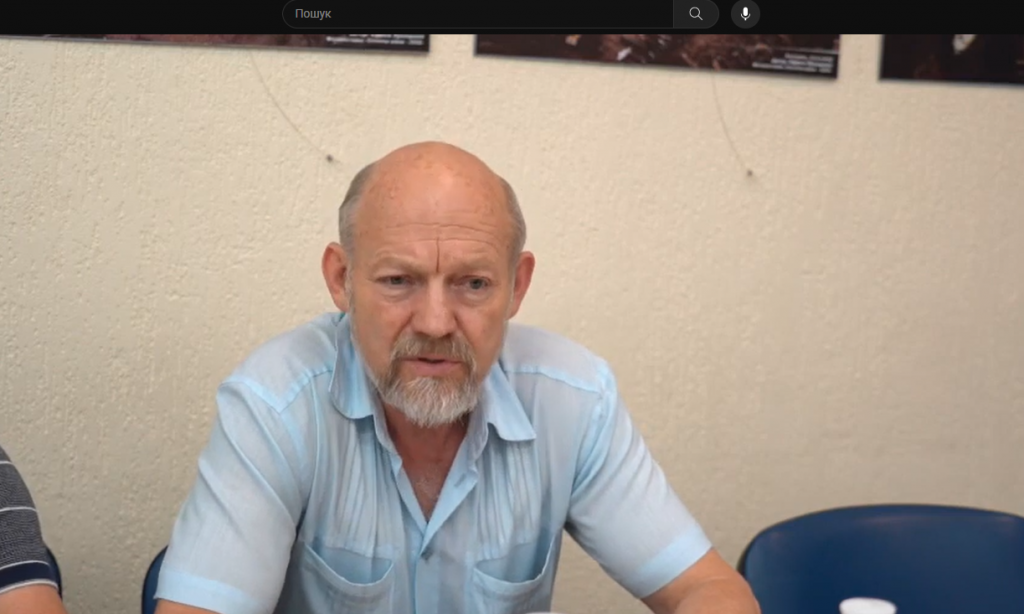
NUJU Secretary/Director of the Mykolayiv College of Press and Television/Director of the Ukrteleradiopressinstitute, Hlib Holovchenko, spoke about the activities of the NUJU in the Mykolayiv Region. He noted the daily support from the Union‘s central office. According to him, not only material support from the Union but also cooperation in improving qualifications is of great importance for local media. He also thanked the NUJU head office for preparing printed information materials.
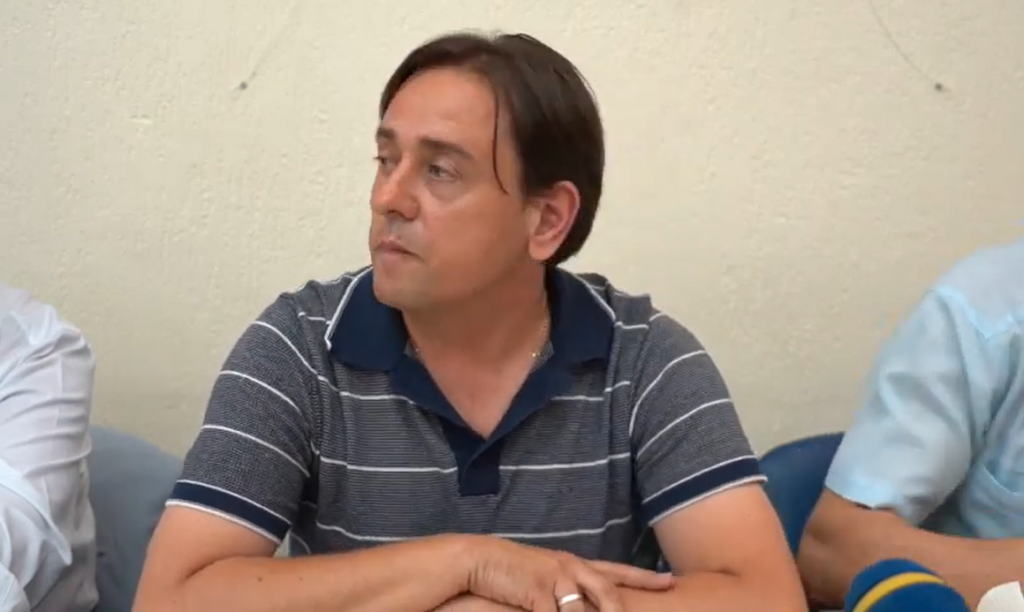
One of the priorities is the restoration of front-line media
At the extended Board meeting, the Union‘s President, Sergiy Tomilenko, reminded that one of the critical priorities of the NUJU is the support of local publications in the front-line and de-occupied territories of Ukraine. So far, with the help of the Union, printing at least one issue of 26 local front-line newspapers has been financed. Sergiy Tomilenko presented a report on researching the needs of such publications conducted by the NUJU specialists.
“This document is needed so that international financial donors better understand how to support front-line newspapers,” said Sergiy Tomilenko.
The secretary of the NUJU/editor-in-chief of the Obrii Iziumshchyny newspaper, Kostiantyn Hryhorenko, spoke about the experience of resuming work after the liberation of Izium from the Russian occupiers, as well as the consequences of the occupation. In particular, the house where the long-time head of the Union, Ihor Lubchenko, once lived was completely destroyed in the city…
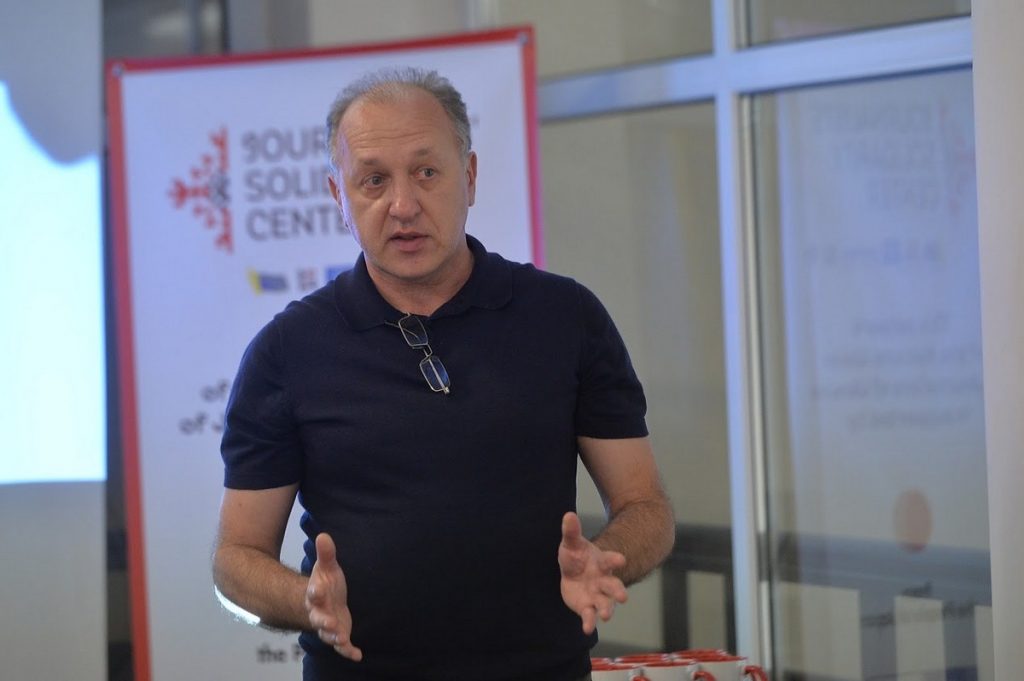
“So far, 12 out of 27 district newspapers in the Kharkiv Region have resumed publishing. There was no help from the authorities and local self-government,” Kostiantyn Hryhorenko added. He emphasized that there is still an information vacuum in many de-occupied territories. The secretary of the NUJU urged his colleagues to be more active in restoring their publications because now the one who restores the first will be in the most advantageous position.
At an extended meeting of the NUJU Board, it was decided to recognize the work of the Union‘s active members in fulfilling priority tasks as satisfactory, to recommend strengthening the ties between the network of Journalists’ Solidarity Centers and regional organizations of the NUJU, to instruct the NUJU leadership to continue working with international partners to attract help to Ukrainian journalists and the media, to note the leading the role of the Union in restoring the publication of newspapers in the front-line territories, to call on the Ukrainian authorities to support this initiative.
Mass dismissal of mail carriers puts newspapers delivery to readers under real threat
In their speeches, NUJU board members paid particular attention to the work of the Ukrposhta state postal enterprise in delivering newspapers to readers.
Member of the NUJU audit commission/editor-in-chief of the Odesa newspaper President Kuriyer, Yosyp Burcho, noted that newspapers could be lost without solving the issue regarding the work of Ukrposhta. According to him, the regional branches of Ukrposhta are deprived of absolutely all rights. “They send any act of completed work to Kyiv. Everything’s done only via Kyiv. By concentrating power in one hand, in the central office, Ukrposhta conducts organized, purposeful work against us, print media,” Burcho noted. According to the editor, in the subscription and delivery agreement, the institution protects only itself. Violating it, the editor pays three times the fine. Yosyp also added that together with the Union, editors should take part in the development of a new contract. “We have the right to demand from the post office that it works not only taking into account economic motives but also socially important ones,” he summarized.
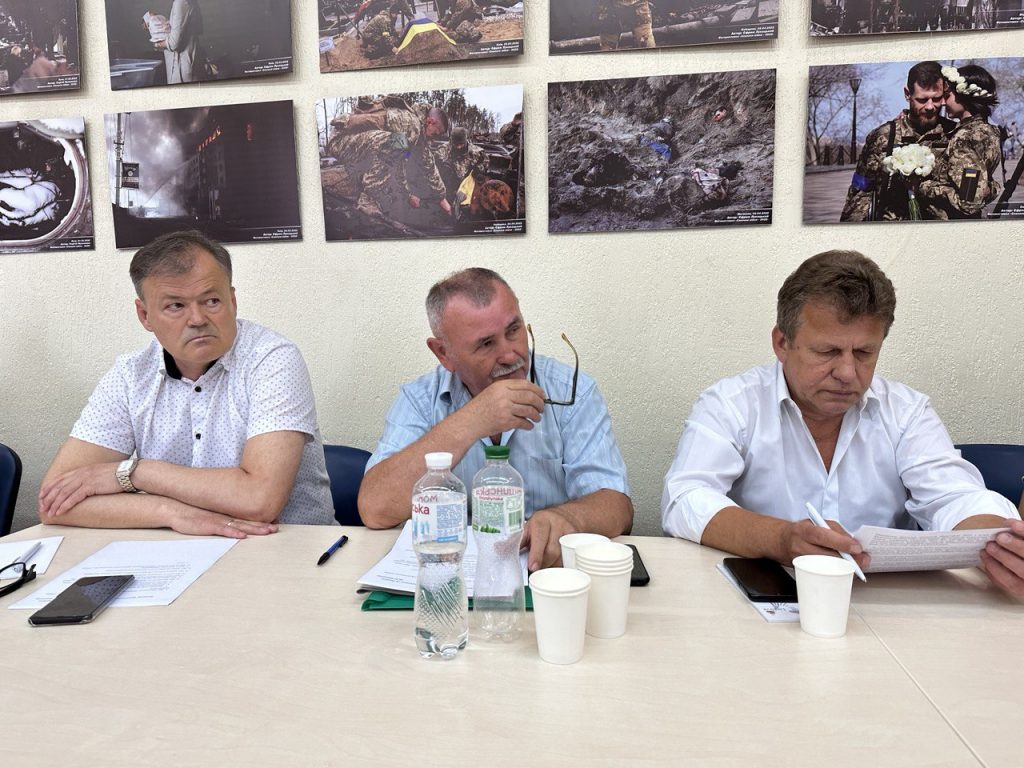
The head of the Rivne regional organization of the NUJU, Dmytro Tarasiuk, emphasized the importance of the solidarity of the Ukrainian media in matters related to relations with Ukrposhta.
According to the head of the Cherkasy regional organization of the Union/the editor-in-chief of the Cherkaskyi Krai newspaper, Tetiana Kalynovska, the mass redundancies among rural mail carriers, which started on July 1, is stirring up communities.
“We have received letters from hundreds of people that the dismissal of mail carriers will lead to the fact that people will not be able to use postal services, will not be able to receive newspapers,” she emphasized. In addition, it is unclear how the digitization of postal communication might be carried out without the Internet, and rural people do not know how to use mobile technology. Tetiana Kalynovska added that it is currently impossible to refuse the services of Ukrposhta, but “its prohibitive tariffs will lead to the fact that newspapers will look for an alternative.” Most newsrooms are already trying to organize subscriptions on their own.
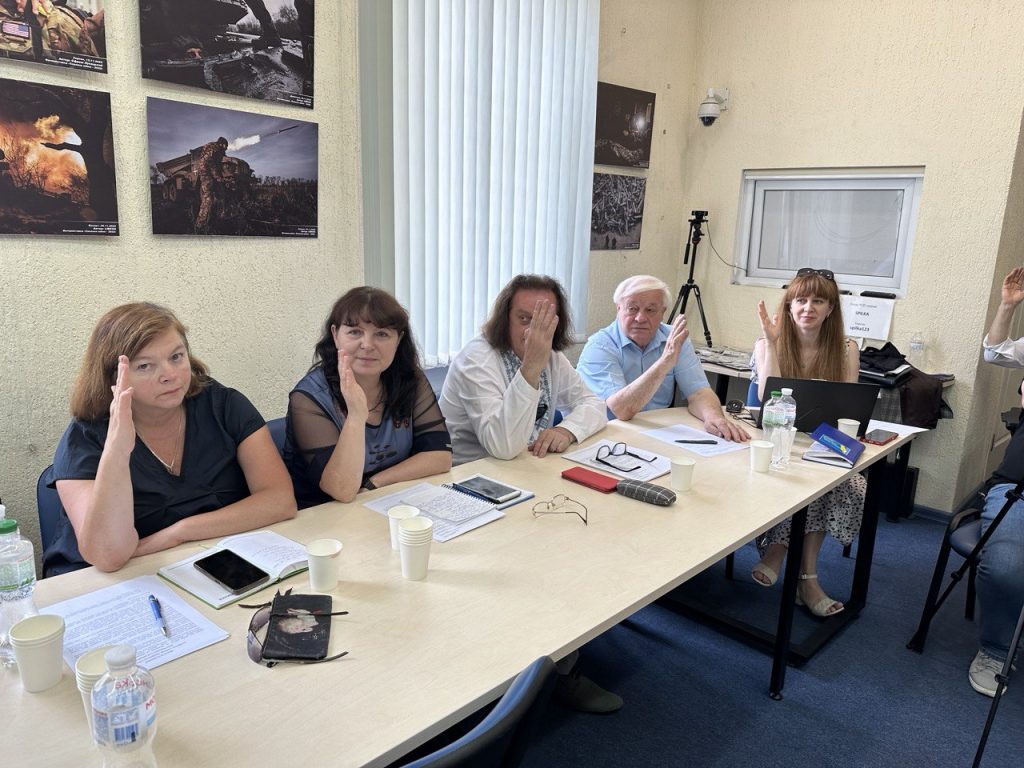
The NUJU‘s extended meeting also approved an appeal to the President of Ukraine, the Government, and the management of Ukrposhta. It was emphasized that the mass dismissal of mail carriers across the country stopped the delivery of newspapers by mail and deprived Ukrainians of access to important information during the war. “We categorically disagree with the destruction of Ukrainian newspapers. We hold and strive to continue to hold the information front. But we need help,” the appeal emphasized.
The NUJU claims that newspapers are on the verge of bankruptcy due to the reduction in the number of mail carriers, the closure of subscription departments of regional directorates, post offices, and bureaucratic procedures. The delivery cost is increasing, reaching 30% of the entire newsroom’s budget. At the same time, the constant reduction of Ukrposhta employees has a highly negative effect on the timely delivery of the newspaper to subscribers. “This is the annihilation of printed media, which are read by millions of people throughout Ukraine,” the appeal authors emphasize. Misunderstandings with Ukrposhta force newspaper publishers, especially in the front-line territories, to look for ways to deliver publications to readers on their own.
The Union proposes to urgently create a workgroup of representatives of the Presidential Office, the Government, the Ministry of Culture and Information Policy, the NUJU, and newspaper publishers to find a joint solution regarding the further work of Ukrposhta.
At the suggestion of the head of the Rivne regional organization of the NUJU, Dmytro Tarasiuk, the Board meeting participants called on the Ukrainian media to publish in their columns the appeal of the Union regarding the mass dismissal of mail carriers.
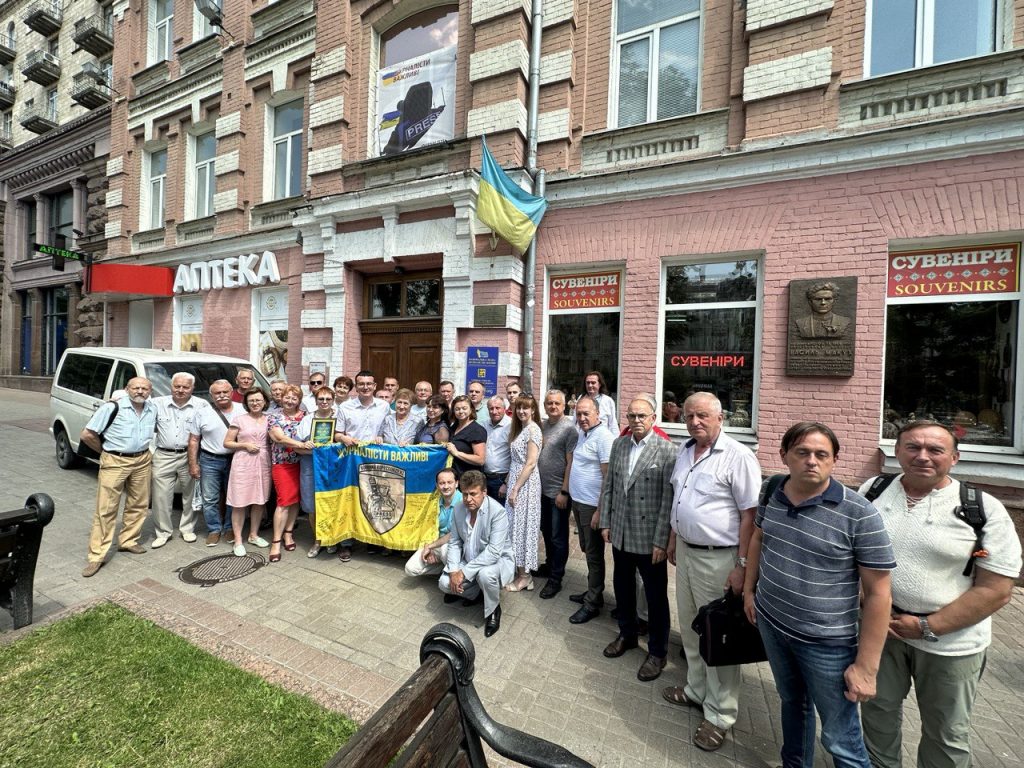
* * *
The Board reviewed the work of the Union in connection with the implementation of the Law of Ukraine On Medi. It was noted that the law is not perfect, and its authors recognize this. It is a lever of state control over journalists and the media. Adopting it during the war, especially in a rather conflictual manner, was inappropriate. At the same time, the law has entered into force, so the Union is trying to help journalists understand its provisions and fulfill the requirements of this regulatory document.
A member of the NUJU audit commission, Maryna Teplenko, who works in the press center of the Air Force of the Armed Forces of Ukraine (AFU), spoke about the problem with the delay in providing Ukraine with multipurpose F-16 aircraft, as well as anti-aircraft and anti-missile defense systems. She asked the NUJU to support the appeal to the International Association of Journalists for supporting the world’s journalistic organizations in their countries’ efforts to provide Ukraine with the necessary weapons. At her suggestion, the Board decided to approve such an appeal.
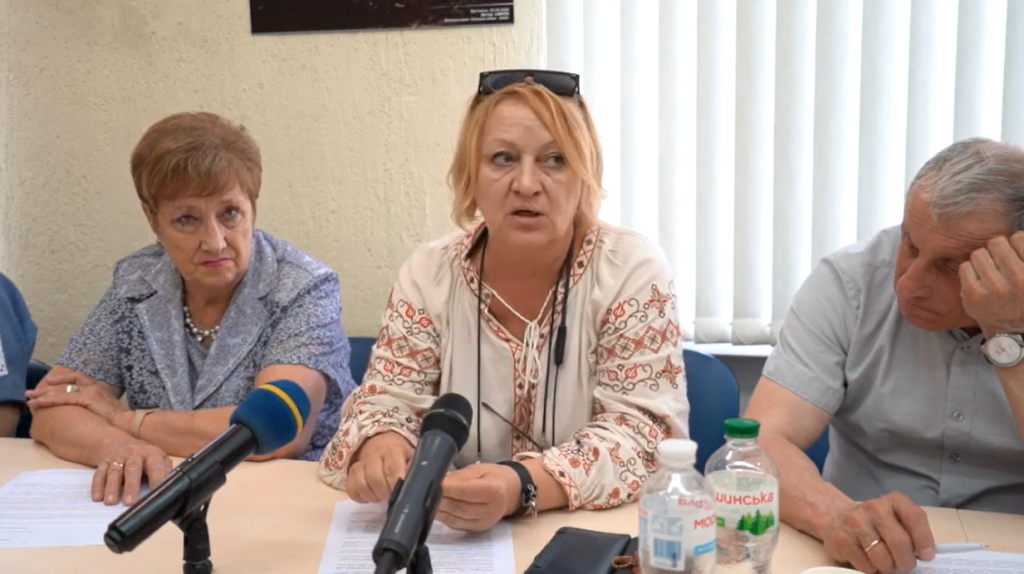
At the end of the meeting, the NUJU leaders called on regional organizations to use all means of informing journalists to unite around the Union, mutual support, and practical cooperation.
The President of the NUJU, Sergiy Tomilenko, presented five representatives of the active Union with the awards of the Chief of the General Staff of the AFU Serhii Shaptala. Union activists were also given awards from the Verkhovna Rada of Ukraine and the Commander of the United Forces of Ukraine/Lieutenant General Serhii Nayev.
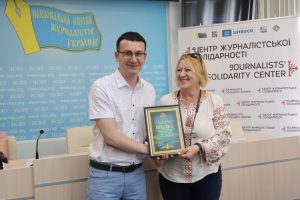
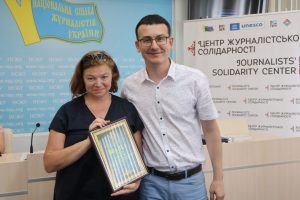
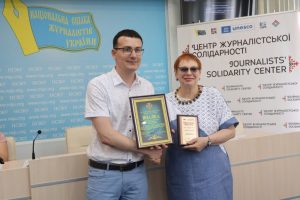
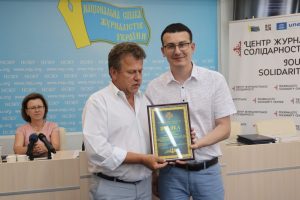
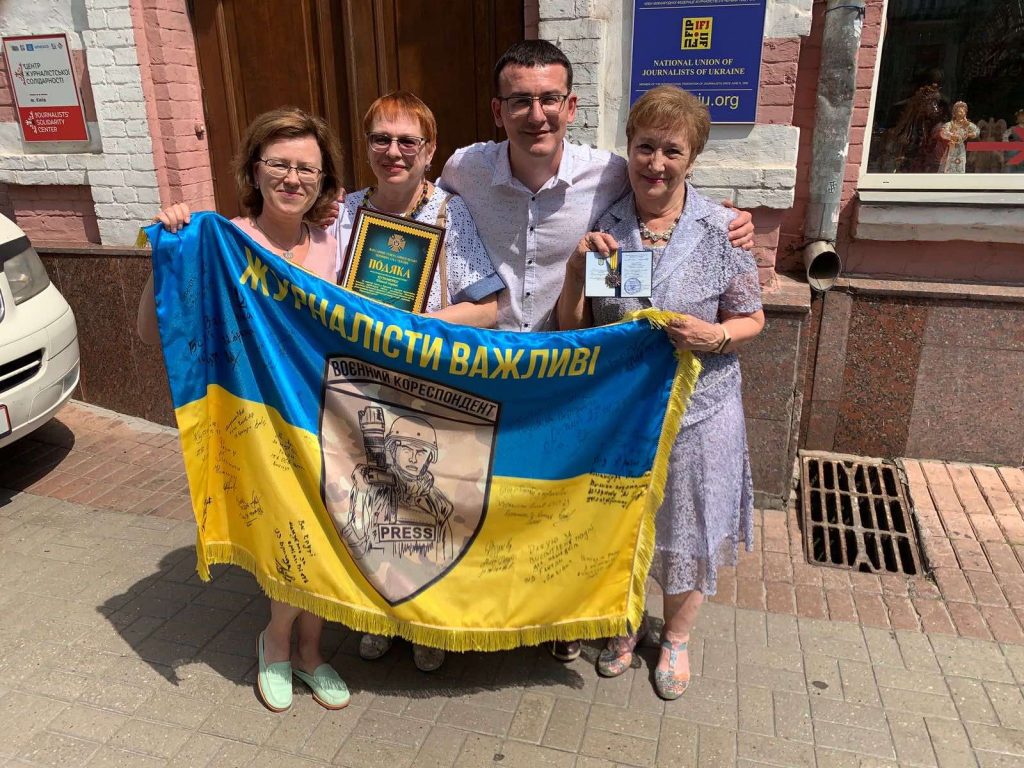
NUJU Information Service

 THE NATIONAL UNION OF
JOURNALISTS OF UKRAINE
THE NATIONAL UNION OF
JOURNALISTS OF UKRAINE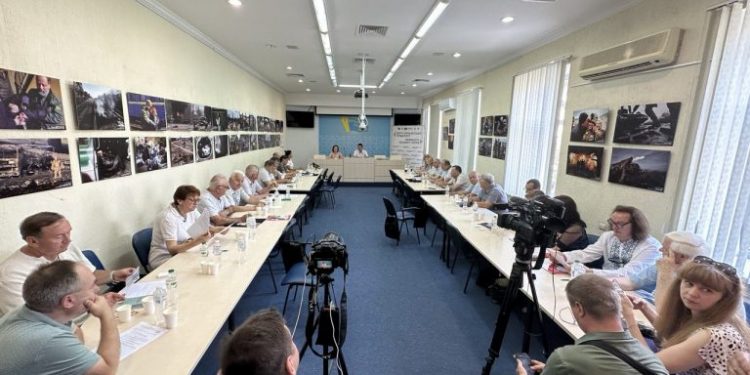
















Discussion about this post